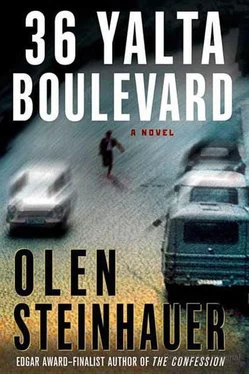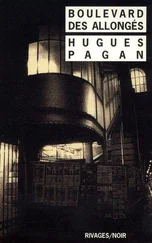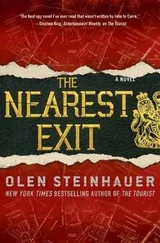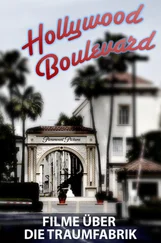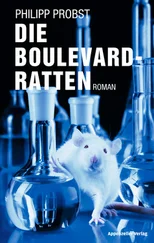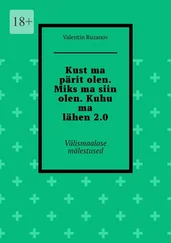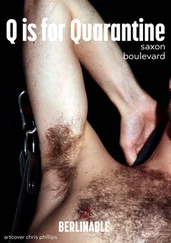Olen Steinhauer - 36 Yalta Boulevard
Здесь есть возможность читать онлайн «Olen Steinhauer - 36 Yalta Boulevard» весь текст электронной книги совершенно бесплатно (целиком полную версию без сокращений). В некоторых случаях можно слушать аудио, скачать через торрент в формате fb2 и присутствует краткое содержание. Жанр: Политический детектив, на английском языке. Описание произведения, (предисловие) а так же отзывы посетителей доступны на портале библиотеки ЛибКат.
- Название:36 Yalta Boulevard
- Автор:
- Жанр:
- Год:неизвестен
- ISBN:нет данных
- Рейтинг книги:3 / 5. Голосов: 1
-
Избранное:Добавить в избранное
- Отзывы:
-
Ваша оценка:
- 60
- 1
- 2
- 3
- 4
- 5
36 Yalta Boulevard: краткое содержание, описание и аннотация
Предлагаем к чтению аннотацию, описание, краткое содержание или предисловие (зависит от того, что написал сам автор книги «36 Yalta Boulevard»). Если вы не нашли необходимую информацию о книге — напишите в комментариях, мы постараемся отыскать её.
36 Yalta Boulevard — читать онлайн бесплатно полную книгу (весь текст) целиком
Ниже представлен текст книги, разбитый по страницам. Система сохранения места последней прочитанной страницы, позволяет с удобством читать онлайн бесплатно книгу «36 Yalta Boulevard», без необходимости каждый раз заново искать на чём Вы остановились. Поставьте закладку, и сможете в любой момент перейти на страницу, на которой закончили чтение.
Интервал:
Закладка:
“Pretty morbid, yes, but it suits me fine. Damn!” He flailed his arms against unseen branches, then fell. Brano crouched, reaching out a hand. He heard Jast’s voice. “What the hell?” And then, “Jesus Christ, what-” Then nothing.
Brano lit another match, which shook as his eyes focused. Pavel Jast also saw what he had tripped over, and leapt up, muttering, “ Oh fuck oh fuck.”
On the ground was a shirtless man, short and heavy, mouth gagged tight over a beard, his stomach and chest and arms covered by numerous tiny cuts. They had bled, tinting the white body pink. Brano touched the sticky, dead wrist, then the still-warm chest, and glanced at the well-tailored black pants and scuffed shoes. He dropped the match and lit another, while Jast jumped from foot to foot, babbling words Brano could no longer make out.
Before they split up at the edge of the woods, Jast told him how to get to Captain Rasko’s home. Brano returned to the dark village, which was no longer haunted by howls from the forest, continued past the church, and near the Militia station opened the wooden gate to a low one-bedroom. He knocked on the loose front door, then did it again. Something fell behind a window; a light came on. The lace curtain was pulled back slightly. Finally, Captain Rasko stood in the doorway, hands shoved in the pockets of a gray robe, his black hair sleep-pressed into an angle. “Comrade Sev,” he said, not bothering to hide his disappointment.
“Sorry to wake you, Comrade Captain. I’m afraid there’s been a murder. In the woods near the cooperative.”
“You’ve got to be kidding.”
“I’m not.”
Rasko stepped back, and Brano entered. There were piles of clothes in the living room and a pungent smell from the kitchen. “Last murder we had was two years ago,” said Rasko.
“You’d better come look at it.”
“And that murder was before my time. I’ve only been Militia chief a year. I don’t even have a staff.”
Brano waited.
“I suppose I should get dressed.”
“I suppose you should.”
Despite the darkness, Brano was able to take him directly to the body. Rasko ran his flashlight beam up and down it. “Jakob.”
“You know him?”
“Of course. Jakob Bieniek. I know him as well as anyone else knows him.” He crouched, made a face, and touched the gag, turning the head aside. “After his wife, Janica, died-I guess that was five years ago-he became… well, strange.”
“How?”
Rasko used the flashlight to investigate the ground around the body. “He was a hermit, Comrade Sev. He dropped out of touch with everyone, which is a feat in Bobrka.”
“His job?”
“Delivered milk from the distribution point in Krosno. But even when he was driving, he wore these tailored suits. See those pants? And his shoes-always polished. He looked foolish.” Rasko shook his head. “What happened to him?”
“Looks like a razor blade, or a few of them, used many times.” Brano followed the flashlight beam with Rasko, walking around the body.
“A match.” Rasko crouched to pick it up.
“It’s mine.”
“Oh.” He paused. “So what were you doing out here?”
“Just walking. I couldn’t sleep.”
“So you came out here? ”
“Aren’t many trees in the Capital.”
Rasko stood still a moment, thinking. “No one really liked Jakob, but I can’t imagine anybody who’d feel this way about him.”
“Somebody did.”
Then they were quiet, staring at the now-cold body. Rasko took a length of wide red ribbon from his pocket and tied it to a tree. “Let’s go.”
At the militiaman’s house, Brano drank a glass of tap water while Rasko called the village doctor, who would get the body in the morning. Rasko told the doctor to watch for the red ribbon. Then he poured a tall vodka for himself and sat across from Brano. “Want to come with me tomorrow?”
“Where?”
“To Jakob’s house. See if we can turn up something.”
“If I won’t be in the way.”
“I’m alone here, Comrade Sev. Your presence can only help.”
Steinhauer, Olen
36 Yalta Boulevard
10 FEBRUARY 1967, FRIDAY
He slept lightly and woke at seven in a sweat. Though he could not remember it, he knew he had again dreamed of that week just after his return from Vienna, spent in the basement of Yalta Boulevard 36.
The Lieutenant General had accompanied him in the white Mercedes from the airport into town. Brano, with his memory now intact, knew better than to speak, and when the other three men guided him to the large double doors of Yalta 36, the Lieutenant General only said, You better cook up some goddamned brilliant answers for us.
But he didn’t come with Brano as the men walked him past a stunned Regina Haliniak at the front desk, along the corridor of unmarked doors to the stairwell that brought them down to the basement. He’d led enough men to these damp, windowless cells to know the route, and even said hello to Stanko, the stout man with round glasses who kept the guardroom organized. Stanko, nodding, could come up with no reply.
A Ministry doctor visited him that night, listened to his heart, and asked him questions. For the memory loss, he could offer no authoritative explanation but suggested stroke. You’re not young, Brano.
The interrogation began the next day, when he was dragged to another room with a table and two chairs. What would always strike him as the great irony of those sessions was that each morning on the table sat a glass of water and the headache powders Brano’s doctor had prescribed, and only after he’d taken them did the Lieutenant General’s assistants feel free to begin what the Americans liked to call his “softening up.” Not until blood flowed did the Lieutenant General arrive.
You set up office in a hotel.
Yes, said Brano. The embassy wasn’t secure.
Maybe you were afraid Major Romek would listen in on your schemes?
I thought nothing of the sort.
Kaspar.
One of the guards struck him across the back of the head.
Don’t be impertinent, Brano.
Working back from the Lieutenant General’s questions, Brano could piece together Lochert’s inventive report. He claimed not only that Brano had attacked him in the Volksgarten the night of the Richter murder but also that over the previous month he had been trying to sabotage the investigation into the identity of GAVRILO. Brano had undermined security at the embassy, consciously casting doubt on the abilities of their head of security, Nikolai Romek, by planting electronic bugs. Why? Because Brano needed an excuse to run his operations outside the embassy, where he could not be watched, at the Hotel Kaiserin Elisabeth. From there he could meet with whomever he wanted.
Lochert, his report claimed, was confused about the why of Brano’s treachery. Only after the incident in the Volksgarten was he able to piece together the details. Brano arrived late because of a liaison with a certain Dijana Frankovic, Yugoslav national, who, besides being the girlfriend of Bertrand Richter, was known to have entertained KGB agents in her apartment on Doblinger Hauptstraee. Brano, Lochert finally realized, was working for the Russians-who, for their own reasons, wanted to hinder Yalta Boulevard’s investigation into the source of their Vienna leak.
This was all, of course, a lie, and two weeks later, after he’d been released from his Yalta cell and given his new labor assignment at the tractor factory, he and Colonel Cerny took a walk together in Victory Park. But why? Brano asked him. Why did he do this?
Cerny had thought it through over the last weeks. Lochert’s lived in Vienna almost a decade; he knows the city and its networks better than anyone. We sent him to Vienna because he grew up in one of those Saxon villages in the Carpathians; we felt he understood the Germanic mindset. And then Kristina Urban was killed.
Читать дальшеИнтервал:
Закладка:
Похожие книги на «36 Yalta Boulevard»
Представляем Вашему вниманию похожие книги на «36 Yalta Boulevard» списком для выбора. Мы отобрали схожую по названию и смыслу литературу в надежде предоставить читателям больше вариантов отыскать новые, интересные, ещё непрочитанные произведения.
Обсуждение, отзывы о книге «36 Yalta Boulevard» и просто собственные мнения читателей. Оставьте ваши комментарии, напишите, что Вы думаете о произведении, его смысле или главных героях. Укажите что конкретно понравилось, а что нет, и почему Вы так считаете.
